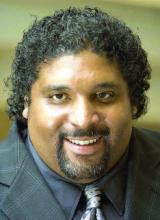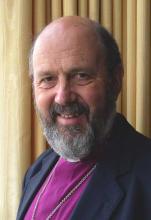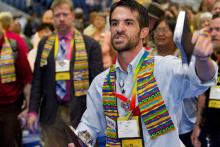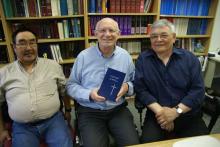Bible

When Jesus showed up, I think it’s interesting that he took that deaf man away from the THEY. He removes him from that system. He sticks his fingers in his ears and spits and touched his tongue and looks to heaven and the text says, he sighed. He looked to heaven and sighed. And the thing is, Jesus didn’t then rebuke the man or his deafness. He didn’t say, I cast out the demon of deafness. He just touched him, looked to heaven, sighed and said “BE OPEN."
It’s a wonderful statement for healing isn’t it? Be open.
It’s an image that’s stuck with me all week. This might sound weird but all week I kept picturing Jesus sticking his fingers in each of your ears and saying “BE OPENED." And then in the same daydream, before I could stop it, I pictured Jesus’ Holy and unwashed fingers in my own ears. He sighed he looked to heaven and he said, "Be opened." To which I said, “No thanks."

THIS SUMMER, in a historic development, nearly 150 evangelical leaders signed an “Evangelical Statement of Principles for Immigration Reform.” Signers came from across the spectrum of evangelicalism, from leading Latino evangelical organizations to pastors Max Lucado, Bill Hybels, Joel Hunter, and Jim Daly, president of Focus on the Family.
No, that isn’t a typo. Sojourners stood side by side with Focus on the Family to draw attention to the plight of millions who have been caught up in a broken system. It was exciting to see a unity across the traditional political spectrum that rarely happens in Washington.
Make no mistake: There are still big gaps in theology and politics among those in the group. But rather than politics, we focused on the things we agreed were fundamental moral issues and biblical imperatives. Instead of ideology, we came together because of morality and common sense.
Big things don’t change in Washington first; they change in the nation’s capital last. You’d think that with all the lobbyists on K Street and the billions of dollars being spent, Washington must be the country’s most important place. But this is the place where things don’t change, where politics maintains the status quo and the special interests maintain their own interests. Both Republicans and Democrats are more concerned with their political bases and getting re-elected than with the people and families whose lives are being crushed.

“Words! Words! Words!
I’m so sick of words!
I get words all day through, first from him, now from you. Is that all you blighters can do?”
So, Liza Doolittle challenges the hapless Freddy Eynsford-Hill at the height of a dramatic confrontation in My Fair Lady. Freddy has come to her rescue, with his flowery, long-winded protestations of love, but poor Liza is fed up with words:
“Don't talk of stars, burning above. If you're in love, show me. Tell me not dreams, filled with desire. If you're on fire, show me.”
And you know, Eliza has a point. A well-turned phrase won’t keep you warm at night.
It’s ironic that this drama was penned by one of the great wordsmiths of the English language. The play turns on the transformation of a poor Cockney girl into a proper English lady through the manipulation of her ability to master the English language. One argument put forth in the course of achieving this goal is that it doesn’t matter what you say as long as you say it properly. Style can compensate for the absence of substance.
In contrast, I listened this week to a powerful sermon preached by the Rev. Nadia Bolz-Weber to a gathering of some 34,000 Lutheran youth gathered in assembly in New Orleans.

In the 31 years since the discovery of HIV and AIDS, nearly 30 million people have died from the virus with 34 million people currently living with the disease.
The epidemic is at its worst in sub-Saharan Africa, and women are affected the most. In fact, 59 percent of people living with HIV and AIDS in sub-Saharan Africa are women.
Statistics like these are mind-numbing. Though necessary, they can nearly cripple our response as they point to the inefficacy of our actions.
This is why, when I teach or write on HIV and AIDS, I prefer to tell stories. And as people of faith, we need stories, both ancient and new, to help us navigate our response to social issues such as HIV and AIDS.

A hotel in the United Kingdom has replaced in-room Gideon Bibles with the soft-porn best-seller Fifty Shades of Grey.
The change was made earlier this month in all 40 guest rooms at the Damson Dene Hotel in the Lake District of England.
The hotel's owner Jonathan Denby explained his decision in a blog post:
"Tonight millions of women will be curling up in bed with a good book and you can bet your life it won't be the Bible. More likely than not it will be Fifty Shades of Grey. I haven't read the book yet – I'm not in the target audience – but I'm told it's a ripping good yarn and everyone who's in the target audience loves it. This made me wonder about the sense of providing a book, the Gideon Bible which no one reads, and many dislike, in the bedside cabinet of our hotel bedrooms, instead of a book which everyone wants to read, such as Fifty Shades of Grey."

Biblical literalism, and the corresponding idea of the inerrancy of scripture, has been bumping up against the sciences for a long time.
Way back in the Renaissance, the church insisted that the Bible taught that the sun revolved around the earth, and charged Galileo with heresy for claiming otherwise. Today, the debate between the Bible and natural science continues, most notably in the evolution/creation debate.
While discussions of religion and science usually revolve around conflicts with natural science, I'd like to propose that the place we really should be placing our attention is the relationship between faith and the social sciences.
As our understanding of all science grows, it becomes harder and harder to maintain the position of biblical literalism without seeming absurd.
Maybe we haven't all heard the thunder clap yet, but the lightning bolt struck a while ago. We are going to have to adjust our reading of the Bible to coincide with a modern scientific understanding of the universe. In broad strokes, that shift has already happened.

On the one hand, I’m encouraged when Christians can have more honest, open dialogue about sex and sexuality in the public forum.
On the other, I’m more than a little distressed when the matter at hand is about “Biblically-based” sexual submission.
For those unfamiliar, there are (at least) two camps in the Christian conversation about gender roles, one of which we can call “egalitarian,” and the other calls itself “complementarian.” The implication of the latter is that, though we are not the same, we males and females fit together in many ways like pieces of a puzzle, one complementing something the other lacks, and vice-versa.
And if the definition of complementarianism stopped there, I would be on board; but in truth it’s a thinly veiled case for women submitting to men. Sorry, but this isn’t complementary; it’s authoritarian.
In a recent post, Rachel Held Evans explained the troublesome issues with complementarianism well:
…For modern-day Christian patriarchalists (sometimes called complementarians), hierarchal gender relationships are God-ordained, so the essence of masculinity is authority, and essence of femininity is submission. Men always lead and women always follow. There is no sphere unaffected by this hierarchy—not even, it seems, sex.

There’s plenty of fodder for sub-par parenting in the Good Book if we want to find it. But based on the examples of Christian parenting I see in more contemporary culture, the things we’d be best to move beyond are a little subtler (sometimes anyway) than the examples above.
Consider James Dobson’s (former head of Focus on the Family) writing on raising children. He advocates corporal punishment, placing the male as the “head of the household,” and other advice that makes a guy like me cringe. And interestingly, a lot of the differences I have with traditional (some might say “evangelical”) Christian parenting parallel my differences in how to approach Christian community all together.
In that light, here are five habits, often attributed to “Christian parenting” values, that I’d just as soon replace with something new.

Rather than mine being a theology of “Jesus died for your sin,” mine is one of “Thy Kingdom come.” That is archaic language, and I find that a little off-putting, yes, but given that it’s from the Lord’s Prayer, attributed to Jesus, I think it’s worth wrestling with. Basically, I share the interpretation of this line of the prayer with many seekers of social justice, like MLK, Walter Rauschenbusch and the like, who believe that the line, “Thy Kingdom come, Thy will be done, on earth as it is in heaven,” is an expression of longing, for God’s love to be fully realized, for our inequities and brokenness to be reconciled here on this earth, and not just some day after we die.
This is not likely something at which we will entirely arrive in this life, but it is something toward which we should re-orient ourselves daily, in order to seek it out, actively and vocally, in all we do. This, I believe, is Christ’s call to the world.

Last year, Gideons International distributed more than 84 million printed copies of the Bible around the world to students, hospitals, members of the military and, of course, hotels, where they are a ubiquitous sight in bedside tables.
Starting this month, however, the InterContinental Hotels Group is modernizing that mission at one of its hotels, replacing the paper tomes with electronic versions of the Bible loaded on Kindle e-readers. Each of the 148 rooms at the chain's Hotel Indigo in Newcastle, England, will be outfitted with a Kindle Touch with Wi-Fi. Guests can use the e-ink devices to catch up on scripture, as well as purchase and read any other books available in the Amazon Kindle store.
Apparently the Gideons are supportive of the hotel group's move toward electronic versions of Holy Writ. (And if a guest is so taken with the Kindle that they take it with them when they check out, the hotel will charge the guest's credit card for the Kindle.)
Read the entire CNN.com report HERE.
God and the Godforsaken
Rafael Luévano, a Catholic priest and professor, writes a moving narrative theology of suffering—based on extensive field research—in Woman-Killing in Juárez: Theodicy at the Border. A powerful blend of reporting, analysis, and poetic theological meditation. Orbis
Searching Harmonies
Veteran songwriter, producer, and musician Phil Madeira pulls together an all-star lineup including The Civil Wars, The Carolina Chocolate Drops, Mat Kearney, and Emmylou Harris for the alt-roots album Mercyland: Hymns for the Rest of Us—nondoctrinal music that yearns for a God who is love. Mercyland Records

The better way says, if we follow God’s religious values we can use global technology, green economy, and targeted economic and infrastructure investment, total access to education, and creative job creation strategies to address the ugly realities of poverty. If we follow the enduring ethic of love we can beat our swords of racism into the plows that will till the new soil of brotherhood and sisterhood
If we see the poor as our neighbors, if we remember we are our brother’s keeper, then we shall put the poor, rather than the wealthy, at the center of our agenda.
If we hold on to God’s values, the sick shall have good health care. The environment shall be protected. The injustices of our judicial systems shall be made just. We shall respect the dignity of all people. We can love all people. We can see all people as God’s creations.
We can use our resources to develop our minds and economy, rather than build bombs, missiles, and weapons of human destruction.
Do we want to keep pressing toward God’s vision? Values are once again the question of our times.
Do we want a just, wholesome society, or do we want to go backwards? This is the question before us. And I believe that at this festival there is still somebody who wants what God wants. Somebody who understands there are some things with God that never change
There are still some prophetic people that have not bowed, who as a matter of faith know that Love is better than hate. Hope is better than despair. Community is better than division.
Peace is better than war. Good of the whole is better than whims of a few. God wants everybody — red, yellow, black, brown and white taken care of. God wants true community, more togetherness … not more separateness. God wants justice, always has, always will.
Because with God some things never change.

After reading my post about Randy Wolford, the snake-handling pastor, died from a venomous snakebite, fellow God's Politics blogger Tim Suttle sent me a link to his own post on the subject. Suttle’s angle was different, and I found it fascinating.
Basically, he contends that the verses in Mark that Wolford and others use to justify handling snakes as an act of worship (among other bizarre practices) should not ever have made it into the Bible to begin with. His article cites what he calls a “nerdy academic journal article” from Bible scholar Robert H. Stein. In it, Stein notes a few reasons why the text in Mark chapter 16 beyond verse 8 should never have been included in the Bible.
First, there have been older copies of the manuscripts from which Mark was produced that stop at Mark 16:8. In addition, there’s the historical agreement among scholars that scribes (the guys who copied the texts by hand) did have a propensity for adding to the documents they copied but seldom, if ever, deleted anything. There’s also the fact that ancient scholars whose commentaries on Mark have been found do not mention these verses at all, as well as the agreement among many Biblical scholars that the tone of those verse suggests a different author wrote them.

Both religion and politics are concerned with how we should organize societies. Yet the tendency for Christians has often been to begin with the politics and work backwards to find religious rationale for our political beliefs. As a result, most people read the Bible not to challenge our deeply held beliefs, but to affirm the decisions we've already made with our lives.
If you tend toward the political right you might say the chief political concern of the Scriptures has as much to do with smaller government, lower taxes, individual freedoms and gun rights as any explicit Christian concept.
If you tend toward the political left you might believe the chief political concern of the Scriptures has more to do with reproductive rights, religious pluralism, big government and labor unions.
Too often the ideologies of the secular right or the political left have been allowed set the terms for religious Christians.
No matter where you stand on the issue of gay marriage, there are some boundaries of human decency that should never be crossed.
Never.
Even in the name of free speech, some boundaries should never be crossed. Pastor Terry Jones crossed that line in burning the Koran and making a global media spectacle. Pastor Wiley Drake crossed that line in suggesting that he was praying for the death of President Obama. And then, of course, there are the folks of Westboro Baptist Church.
But this…?!#@
Wow, this takes the prize for the most idiotic, insane, stupid, asinine, cruel, ungodly, foul, inexcusable, heinous, and disgusting comments by any person – let alone someone that calls himself a pastor and shepherd.

The oft-cliched Christian notion of heaven -- a blissful realm of harp-strumming angels -- has remained a fixture of the faith for centuries. Even as arguments will go on as to who will or won't be "saved," surveys show that a vast majority Americans believe that after death their souls will ascend to some kind of celestial resting place.
But scholars on the right and left increasingly say that comforting belief in an afterlife has no basis in the Bible and would have sounded bizarre to Jesus and his early followers. Like modern curators patiently restoring an ancient fresco, scholars have plumbed the New Testament's Jewish roots to challenge the pervasive cultural belief in an otherworldly paradise.
The most recent expert to add his voice to this chorus is the prolific Christian apologist N.T. Wright, a former Anglican bishop who now teaches about early Christianity and New Testament at Scotland's University of St. Andrews. Wright has explored Christian misconceptions about heaven in previous books, but now devotes an entire volume, "How God Became King: The Forgotten Story of the Gospels," to this trendy subject.

Despite emotional protests and fierce lobbying from gay rights groups, United Methodists voted on Thursday to maintain their denomination's stance that homosexuals acts are "incompatible with Christian teaching."
Two "agree to disagree" proposals were soundly defeated during separate votes by the nearly 1,000 delegates gathered for the United Methodist Church's General Conference in Tampa, Fla.
One proposal would have replaced the "incompatible" phrase in the Book of Discipline, which contains the denomination's laws and doctrines. Both proposals sought to soften the disputed doctrine by adding more ambiguous statements about homosexuality.
Gay rights advocates in the UMC viewed the compromise proposals as the best chance to advance their cause at this year's General Conference, which convenes every four years. On Friday, delegates are expected to debate the church's bans on noncelibate gay clergy and same-sex marriage.

The Bible is by far the most translated book in history. Portions of the Old and New Testaments have been translated into more than 2,500 languages. According to United Bible Societies, the complete Bible has been rendered into 469 tongues as of 2010.
Add Inuktitut to that list.
Later this spring, an entire Bible in Inuktitut, the language of Inuit people and the most widely spoken aboriginal tongue in Canada's Arctic, will be dedicated at an igloo-shaped church in Nunavut, an autonomous region carved out of the Northwest Territories in 1999.

“We know love by this, that he laid down his life for us--and we ought to lay down our lives for one another. How does God's love abide in anyone who has the world's goods and sees a brother or sister in need and yet refuses help? Little children, let us love, not in word or speech, but in truth and action.”
On April 29th, many churches will be hearing this reading from I John 3:16-24 as the Epistle Lesson for the Revised Common Lectionary for the Fourth Sunday of Easter/Year B. Here is a new hymn inspired by this biblical teaching for compassion.

The name Jesus Christ doesn't appear in "The Voice," a new translation of the Bible.
Nor do words such as angel or apostle. Instead, angel is rendered as "messenger" and apostle as "emissary." Jesus Christ is "Jesus the Anointed One" or the "liberating king."
That's a more accurate translation for modern American readers, said David Capes, lead scholar for "The Voice," a complete edition released this month by publishing company Thomas Nelson. Capes says that many people, even those who've gone to church for years, don't realize that the word "Christ" is a title.